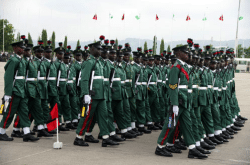The Nigerian Armed Forces are the Armed Forces of the Federal Republic of Nigeria. The military has active duty personnel in three armed services, totaling about 200,000 troops and 300,000 paramilitary personnel. Its origins lie in the elements of the Royal West African Frontier Force that became Nigerian when independence was granted in 1960. In 1956 the Nigeria Regiment of the Royal West African Frontier Force (RWAFF) was renamed the Nigerian Military Forces, RWAFF, and in April 1958 the colonial government of Nigeria took over from the British War Office control of the Nigerian Military Forces. There has been a strong military coup culture, between 1966 and 1999 10 Military Coups in Nigeria took place.
Since its creation the Nigerian military has fought in a civil war – the conflict with Biafra in 1967–70 – and sent peacekeeping forces abroad both with the United Nations and as the backbone of the Economic Community of West African States (ECOWAS) Cease-fire Monitoring Group (ECOMOG) in Liberia and Sierra Leone. It has also seized power twice at home (1966 & 1983) and today ‘has become entrenched in all facets of [Nigerian] civic and economic life,’ including manipulation of national political life – General Sani Abacha’s creation of artificial political parties – and a central role in the control and management of Nigeria’s oil wealth.
In the aftermath of the civil war, the much expanded size of the military, around 250,000 in 1977, consumed a large part of Nigeria’s resources under military rule for little productive return. The great expansion of the military during the civil war further entrenched the existing military hold on Nigerian society carried over from the first military regime. In doing so, it played an appreciable part in reinforcing the military’s nearly first-among-equals status within Nigerian society, and the linked decline in military effectiveness. Olusegun Obasanjo, who by 1999 had become President, bemoaned the fact in his inaugural address that year: ‘… Professionalism has been lost… my heart bleeds to see the degradation in the proficiency of the military.’[5]
Nigeria sends many of its officers to Pakistan for training. Particularly, to institutions such as the Pakistan Military Academy, Command and Staff College in Quetta and to the National Defence University, Islamabad. Training establishments in Nigeria include the initial officer entry Nigerian Defence Academy at Kaduna, the Armed Forces Command and Staff College, Jaji, and the National War College at Abuja ([1]). The U.S. commercial military contractor Military Professional Resources Inc. has been involved from around 1999–2000 in advising on civil-military relations for the armed forces.[6]
Legal standing
The roles of a country’s armed forces are entrenched in her Constitution. The defence of the territorial integrity and other core interests of the nation form the major substance of such roles. Section 217 of the 1999 Constitution of Nigeria addresses the Nigerian Armed Forces:
(1) There shall be an armed forces for the Federation which shall consist of an army, a navy, an air force and such other branches of the armed forces of the Federation as may be established by an Act of the National Assembly.
(2)The Federation shall, subject to an Act of the National Assembly made in that behalf, equip and maintain the armed forces as may be considered adequate and effective for the purpose of –
(a) defending Nigeria from external aggression;
(b) maintaining its territorial integrity and securing its borders from violation on land, sea, or air;
(c) Suppress insurrection and act in aid of civil authorities to restore order when called upon to do so by the d. President but subject to such conditions as may be prescribed by an Act of the National Assembly.
(d) Perform such other functions as may be prescribed by an act of the National Assembly.
(3) The composition of the officer corps an other ranks of the armed forces of the Federation shall reflect the federal character of Nigeria.
Nigerian Army
The Nigerian Army (NA) is the land branch of the Nigerian Armed Forces and the largest among the armed forces. The Mission Statment of the The Nigerian Army is “To win all land battles in defence of the territorial integrity of Nigeria, protect her national interests, and accomplish other tastks in aid of civil authority”. More About the Nigerian Army & How To Join here
Nigerian Navy
The Nigerian Navy (NN) is the sea branch of the Nigerian Armed Forces. The Nigerian Navy command structure today consists of the Naval Headquarters based in Abuja, two operational commands with headquarters in Lagos and Calabar, two training commands with headquarters in Lagos but with training facilities spread all over Nigeria, two operational bases, five forward operational bases (with two more soon to come on stream), two dockyards in Lagos and Port Harcourt and two fleets based in Lagos and Calabar. The navy has 18000 personnel, including those of the Coast Guard.
Nigerian Air Force
The Nigerian Air Force was formally established in January 1964 with technical assistance from West Germany. The air force started life as a transport unit with aircrew being trained in Canada, Ethiopia and India. The air force did not get a combat capability until a number of MiG-17 aircraft were presented by the Soviet Union in 1966.
In 2007 the Air Force had a strength of 10,000. It flies transport, trainer, helicopter, and fighter aircraft, of which the IISS says there is ‘very limited operational capability.’
The Air Force sponsors the Air Force Military School, Jos, Nigeria.
Nigeria also has pursued a policy of developing domestic training and military production capabilities. Nigeria has continued a strict policy of diversification in her military procurement from various countries.
Source: Wikipedia, the Nigeria Army official website


